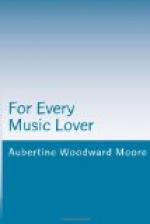“The scientific laws of music are transitory, because they have been tentatively constructed during the gradual development of the musical faculty,” says W. H. Hadow, in his valuable “Studies in Modern Music.” “No power in man is born at full growth; it begins in germ, and progresses according to the particular laws that condition its nature. Hence it requires one kind of treatment at one stage, another at another, both being perfectly right and true in relation to their proper period. But there are behind these special rules certain psychological laws which seem, so far as we can understand them, to be coeval with humanity itself; and these form the permanent code by which music is to be judged. The reason why, in past ages, the critics have been so often and so disastrously at fault is that they have mistaken the transitory for the permanent, the rules of musical science for the laws of musical philosophy.”
An acquaintance with form as the manifestation of law is essential to an intelligent hearing of music. The listener should have at least a rudimentary knowledge of musical construction from the simplest ballad to the most complex symphony. Having this knowledge it will be possible to receive undisturbed the impressions music has to give, and to distinguish the trivial and commonplace from the noble and beautiful.
The oftener good music is heard the more completely it will be appreciated. Therefore, they listen best to music who hear the best continually. The assertion is often heard that a person must be educated up to an enjoyment of high class music. Certainly, one who has heard nothing else must be educated down to an enjoyment of ragtime, with its crude rhythms.
“We know a true poem to the extent to which our spirits respond to the spiritual appeal it makes,” says Dr. Hiram Corson. It is the same with a true musical composition. We must take something to it, in order to receive something from it. Beyond knowledge comes the intuitive feeling which is enriched by knowledge. Through it we may feel the breath of life, the spiritual appeal, which belongs to every great work of art and which must forever remain inexplicable.
VI
The Piano and Piano Players
When Pythagoras, Father of Musical Science, some six centuries before our era, marked and sounded musical intervals by mathematical division on a string stretched across a board, he was unconsciously laying the foundation for our modern pianoforte. How soon keys were added to the monochord, as this measuring instrument was named, cannot positively be ascertained. We may safely assume it was not slow in adopting the rude keyboard ascribed by tradition to Pan pipes, and applied to the portable organ of early Christian communities.




